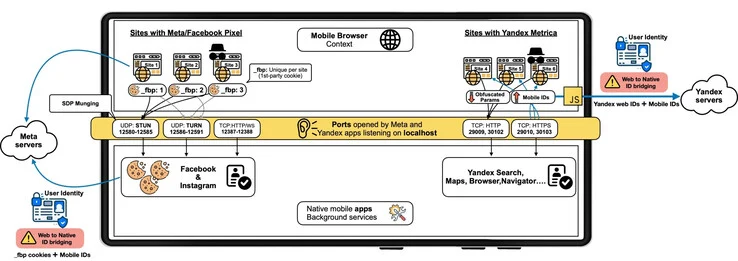Key Takeaways
1. Facebook is facing controversy for how it manages personal information, specifically regarding data transfer from Google Chrome to the Facebook app.
2. Facebook’s tracking tools collect unique browser identifiers, allowing access to users’ complete browsing history, even in private mode or after deleting cookies.
3. Over 5.8 million websites use the tracking tool “Pixel Meta,” with a similar method employed by Yandex on over 3 million sites.
4. The tracking technique violates Android’s usage regulations, and Google has confirmed that measures are being taken to address the issue.
5. Meta attributed the issue to a “communication error” with Google policies, while Yandex claims it does not collect sensitive information.
Facebook is currently embroiled in a significant controversy regarding the way it manages personal information. Several specialists from the IMDEA Networks Institute have discovered pieces of code that facilitate the transfer of data from Google Chrome to the Facebook app, aiming to recover and scrutinize potentially sensitive data.
Simple but Concerning Technique
Delving deeper into the matter, the method appears rather straightforward. Facebook’s tracking tools, found on numerous websites with the intention of analyzing innocuous elements like ad effectiveness, collect the unique identifier of your web browser. This information is then sent to the Meta app installed on your device. Consequently, even if you’re not logged into Facebook via Chrome, the app can still access your complete browsing history. Alarmingly, this also holds true when you’re using private browsing or have deleted your cookies.
Widespread Use of Tracking Tools
The IMDEA Networks Institute estimates that more than 5.8 million websites utilize this tracking tool known as “Pixel Meta.” Additionally, Yandex, a search engine from Russia, reportedly employs a similar method, with tracking algorithms present on over 3 million sites.
Violations of Android Rules
Even if you don’t feel personally affected by this recent revelation, it’s crucial to recognize that it breaches Android’s usage regulations, as reported by Ars Technica. The sharing of data is governed by various rules on the Android platform.
Ars Technica reached out to Google for their take on the situation, and the American tech giant confirmed that the tracking technique used by Meta’s affiliate contravenes their guidelines. Reportedly, measures are already in the works to curb further misuse. Since the unveiling of this troubling finding, no interactions between Google Chrome and the Facebook app have been detected.
Meta and Yandex Respond
In closing, Meta has commented on the issue, citing a “communication error regarding the application of certain Google policies.” On the other hand, Yandex claims it does not gather sensitive information and emphasizes that its practices help enhance the personalization of its services.
Source:
Link





